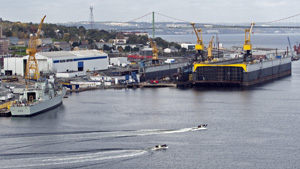Response from Irving Shipbuilding and Seaspan regarding the Rideau Institute Report
Source: Canada NewsWire
Published Date: December 19, 2013
HALIFAX AND NORTH VANCOUVER, Dec. 19, 2013 /CNW/ -
Critical debate is healthy. Grossly inaccurate, misleading, factually-empty debate is irresponsible.
The recently published Rideau Institute paper by Michael Byers and Stewart Webb does nothing to build confidence among Canadians in the future of our industry or the strategically-sound decisions of our naval and government leaders. Nor does it recognize the considerable commitments made by our organizations to our government customers and the country.
"Blank Check" is perhaps the most apt description of the authors' failure to fact check. At no time during the course of "research" were our shipyards contacted to verify information or correct errors before this misleading report was released, in which we have identified 23 separate factual errors.
Please allow us to set the record straight:
Several of the best practices employed through the NSPS procurement process, as cited by Canada's Auditor General (AG), included validation by third-party experts and strong governance and continuous engagement with the shipyards and suppliers. First Marine International's (FMI) capability assessment during the bidding process looked at all aspects of the competing yards, from facilities and equipment to experience, processes and workforce. The resulting reports identified the gaps between where we are and where we need to be (our target state). We are committed to closing all of the gaps at no cost to Canada.
The plans to bridge the gaps that we included in our bids formed a large part of our overall scoring and are our roadmaps for the months and years ahead. We have clear targets and milestones to achieve target state, and we have deadlines for meeting them. And we will open our operations to FMI so they may reassure our customers, and Canadians, that we're on the right track.
At Seaspan and Irving Shipbuilding, we are investing $200M and $300M respectively to develop world-class shipbuilding capability and competitive, efficient facilities and equipment. This investment is designed to allow us to deliver best value to Canada. It is also resulting in jobs, economic benefits and spin-offs today, before either of us have cut steel on the first vessels to be built in our yards.
Canada's Auditor General agrees the National Shipbuilding Procurement Strategy (NSPS) will eliminate the boom and bust cycle in the sector while ensuring 30 years of sustained job creation and economic activity. The AG also described the NSPS selection process as "successful and efficient", recommending it be adopted for future procurements.
Canada's AG concluded that, through the NSPS, the Government is managing the acquisition of military ships in a timely, affordable, efficient, and transparent manner that will support the shipbuilding industry for years to come. All of our contracts and agreements with Canada include performance and capability improvements milestones based on independently validated benchmarking; specific value proposition commitments that will benefit the Canadian Marine Industry; as well as a genuine commitment to open-book accounting.
Detailed estimates for vessels are submitted to the government, who then validate the information using third party expertise. Ships are fully designed before final price quotes are determined so the greatest certainty is known in the costing. Fully designing the ship before start of production also reduces errors and rework, which reduces the overall vessel cost. We were well aware going into NSPS that if we don't perform on-time and on-budget, Canada has no commitment to give us further contracts. This was a significant way for Canada to de-risk the project, a decision that both shipyards firmly support.
We understand completely the responsibility to provide value for every dollar spent by Canadian taxpayers, and we will continue to work in partnership with our customers to manage costs, look for savings, and ultimately deliver quality vessels. We are in this for the long term. And our sincere belief is that the Royal Canadian Navy, the Canadian Coast Guard and the country will benefit.
The Canadian government made a deliberate decision to build ships in Canada, for Canadians, by Canadians. This is the mandate of the NSPS. When faced with renewing the Royal Canadian Navy (RCN) and the Canadian Coast Guard (CCG) fleets, one of the largest military procurement projects since WWII, Canada made a decision to build a limited number of Shipbuilding Centres of Excellence in Canada. A successful model used in most NATO countries, it ensures a capable, efficient shipbuilding and repair capacity now and into the future.
We are proud to be Canada's selected shipbuilders. It was competitively won through perseverance, quality workmanship, customer trust, workforce, and commitment. We are committed to our employees, the shipbuilding industry, the RCN, the CCG, and to Canada as a whole.
This is good for our industry. It is positive for our companies. It creates sustaining quality employment, economic benefits and spin-offs, and a growing, vibrant national Marine Industry. It also builds our industry's capabilities, allowing us to compete more effectively on a global basis. This is good for Canada.
Kyle Washington,
Executive Chairman and Owner,
Seaspan ULC
Jim Irving,
Chief Executive Officer
Irving Shipbuilding Inc.
SOURCE IRVING SHIPBUILDING INC.



Site design by Ravensfoot